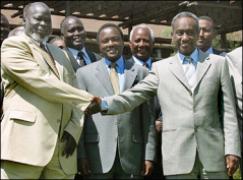Sudanese government to resume talks with southern rebels
By RODRIQUE NGOWI, Associated Press Writer
NAIROBI, Kenya, Sep 21, 2004 (AP) — The Sudanese government is set to resume talks next month on a permanent cease-fire with southern rebels in an effort to end a 21-year civil war that has wracked Africa’s largest nation, mediators and negotiators said Tuesday.
 The talks will resume in neighboring Kenya Oct. 7 in the search for a comprehensive peace deal on the southern conflict, said Sayed el-Khatib, a Sudanese government negotiator.
The talks will resume in neighboring Kenya Oct. 7 in the search for a comprehensive peace deal on the southern conflict, said Sayed el-Khatib, a Sudanese government negotiator.
The talks are not related to separate fighting in the Darfur region of western Sudan, where pro-government Arab militias are accused of waging a campaign of murder, rape and arson on African villagers. According to United Nations estimates, more than 1.2 million people have fled their homes to escape the Darfur violence and more than 50,000 have died.
The older conflict in southern Sudan broke out in 1983 after the rebels from the mainly animist and Christian south took up arms against the predominantly Arab and Muslim north. More than 2 million people have died, mainly through war-induced famine.
The insurgents say they are fighting for better treatment and for southerners to have the right to choose whether to remain part of Sudan.
Although often simplified as a religious war, the conflict is fueled by historical disputes and competition for resources, including major oil reserves.
Since the latest round of peace talks began in Kenya in 2002, the parties have signed protocols on how to share power and natural wealth, what to do with their armed forces during a six-year transition period and how to administer three disputed areas in central Sudan.
Once a permanent cease-fire is reached, then the parties are to try to work out a comprehensive peace deal.
The two issues “are important because you cannot have a peace agreement without a permanent cease-fire,” said Samson Kwaje, spokesman of the rebel Sudan People’s Liberation Army. “The permanent cease-fire will ensure that there is a free movement of people and that no hostilities resume.”
